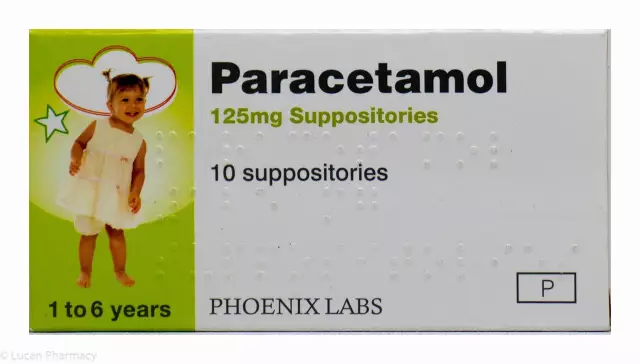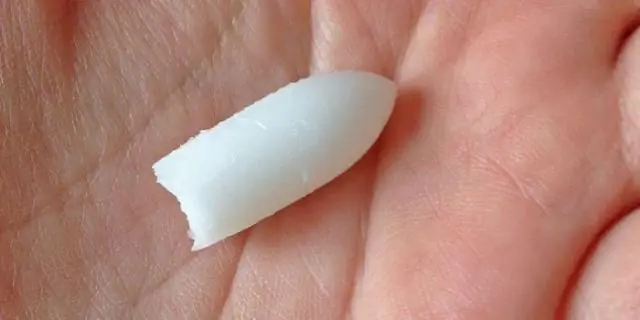- Author Rachel Wainwright wainwright@abchealthonline.com.
- Public 2023-12-15 07:39.
- Last modified 2025-11-02 20:14.
Suppositories Paracetamol for children

Paracetamol is a drug with antipyretic and analgesic effects. It belongs to the group of non-steroidal anti-inflammatory drugs and is known under various trade names: Efferalgan, Tsefekon D, Paracetamol, Panadol, etc.
Paracetamol candles for children are available in foil or plastic packaging. One suppository, depending on the dosage, can contain from 0.125 to 1 g of active ingredient.
Indications for use
Since Paracetamol has a pronounced analgesic and antipyretic effect, it is used in the following cases:
- SARS, pneumonia and bronchitis, causing an increase in body temperature up to 38 ° C and higher;
- Neurogenic and headaches (neuralgia, migraine and sciatica);
- Toothache;
- Pain from burns and injuries;
- Inflammatory diseases of the throat, ear and nose, which are accompanied by mild to moderate pain syndrome.
Pharmacological action of suppositories Paracetamol for children
The action of Paracetamol is based on its ability to block the work of cyclooxygenase. This enzyme is responsible for the formation of biologically active substances - prostaglandins from arachidonic acid, and they just cause a local and general inflammatory response of the body. Paracetamol, blocking the activity of cyclooxygenase, thereby has a central anti-febrile and analgesic effect.
The instructions for the Paracetamol suppositories for children indicate the following rate of entry of the active substance into the blood and its distribution throughout the body: the maximum concentration is achieved after 30-40 minutes. after the introduction.
The action of the drug lasts about 4 hours, after which the content of the active component in the blood is halved, since part of it is processed in the liver. As a result of the decomposition, poisonous products are formed, which, if the concentration is exceeded, can lead to serious damage to the liver cells (drug hepatitis).
Method of administration and dosage
According to the instructions of the candle, Paracetamol for children is used rectally, the dose of the drug depends on the age of the child:
- 1 suppository, 0.08 g per day - babies 3-12 months;
- 1 suppository 0.17 g each - for children 1-6 years old;
- 1 suppository of 0.33 g - at 7-12 years old;
- 1-2 suppositories of 0.33 g - over the age of 12 years (the interval between injections is at least 4 hours).
The duration of the use of the drug depends on the nature of the disease, the severity of its course and the effect achieved.
Contraindications and side effects of suppositories Paracetamol for children
Contraindications for taking Paracetamol are largely determined by the form of its release. Any type of drug, including suppositories, cannot be used for the following diseases:
- Bronchial asthma;
- Diseases of the blood, kidneys and liver;
- Hemorrhagic syndrome;
- Peptic ulcer of the stomach and duodenum;
- Reduced blood clotting.

Paracetamol suppositories for children are contraindicated, according to experts, in case of hypersensitivity to the components of the drug, when the patient's history has allergic reactions in the form of urticaria, diathesis and Quincke's edema.
Possible side effects with this drug are liver damage, increased bleeding, suppression of hematopoiesis, and the development of allergic reactions.
In case of an overdose of the drug, digestion is disturbed (vomiting, nausea, frequent stools), sweating increases. Later, signs such as shortness of breath, weakness, impaired consciousness and malfunctioning of the heart and respiratory system appear.
When the first symptoms of an overdose appear, an urgent need to consult a doctor.
YouTube video related to the article:
Found a mistake in the text? Select it and press Ctrl + Enter.






